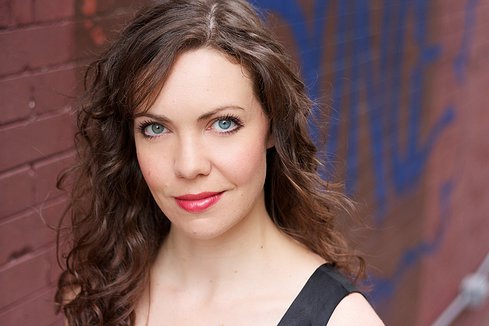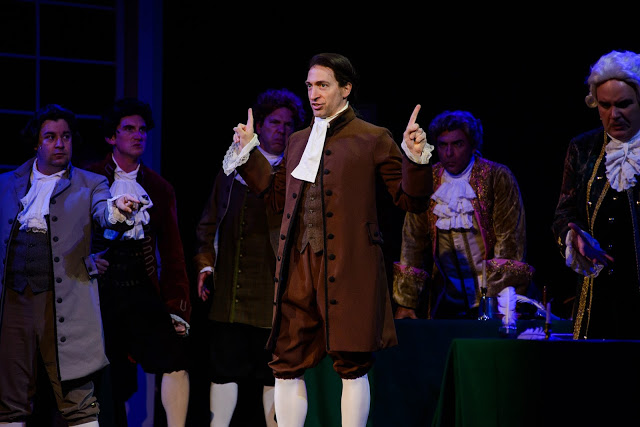Through May 22, 2016, Media Theatre presents 1776: THE MUSICAL, an entertaining, thought-provoking introduction to the fights among politicians as the 13 colonies break off from Britain as the nascent United States (read Phindie reviews here and here). Media’s director Jennie Eisenhower—a popular stage, film, and TV actor; director; and history buff—has performed off-Broadway and at regional theaters across the U.S. for over a dozen years. She has won two Barrymore awards and several Barrymore nominations.
For this production, Eisenhower directed a team of twenty-six talented Philadelphia actors who transition beautifully into famous historical characters (sometimes understudying several roles), ranging from high school junior Thomas Locke as the Courier who delivers the desperate letters from General Washington, to experienced actor Michael Fuchs as John Knox Witherspoon.
In this, the first of a two-part interview, we talk to Eisenhower about her background and work on the production. [Media Theatre, 104 E State St., Media, PA] April 13-May 22, 2016; mediatheatre.org.

Photo by Kim Carson.
1776: Research into American History
Eger: How long have you and your family lived in the greater Philadelphia area and how much did your relationship with this historic city influence your directing 1776 in Media?
Eisenhower: I’ve lived in the Philly area since my parents and I moved here when I was two years old. I have lived in other cities (Chicago for college, New York City, and Tampa) but love Philadelphia. I’ve always had a great interest in our nation’s history, and I am sure growing up near where it all began contributed to that interest.
Eger: Tell us about your background research for 1776.
Eisenhower: I read a lot in prep for 1776. The two books that came the most highly recommended and were the most useful were 1776 by David McCullough and Revolutionary Summer by Joseph J. Ellis. I also visited Independence Hall to just breathe the same air these historic giants breathed and be present in the space where everything happened. It was incredible to be able to do that so easily, living in Philadelphia.
Eger: Did you consult with historians, including your parents who know more about U.S. history than most Americans?
Eisenhower: I’ve always been interested in US history and, of course, my family background plays into that interest. We were more of a Civil War nerd family—my father took us to Gettysburg when I was twelve and gave us an on-site blow by blow of Pickett’s Charge—as well as WW2 junkies. So the Revolutionary War, for me, took a little more digging to feel fully prepared to direct a piece about it.
My father, David Eisenhower [President Eisenhower’s only grandson], was the person who recommended I read 1776 by McCullough. I also consulted with Stephanie Muntone, who is an historian, a costume designer, and a friend. She sent me quite a bit of background research on Washington’s letters. I was lucky to have direct access to two brilliant historians.
Eger: When you direct, do you usually steep yourself in as many materials as possible, including watching videos, interviews, etc., or do you prefer to rely on the script and your own imagination?
Eisenhower: It’s interesting because, when I am acting, the minute I book a role, I cut myself off from any other interpretations of it, be it cast recordings, movies, YouTube, etc. As a director, however, I feel it is my responsibility to have an awareness of what choices were made with the piece prior to my work on it. It is helpful to see what others did with it, and also allows me to avoid unknowingly making the same choices. If I’m going to steal great ideas, I want to know I’m doing it! I watched the archival recording of the Broadway revival (on file at Lincoln Center), the movie, and clips of several other productions online.

Working with the artistic team
Eger: What stands out for you about the team that recreated the world of Philadelphia in 1776—often with a touch of delicious satire—especially the six directors: scenic design (Matthew Miller), sound design (Carl Park), costume design (Katie Yamaguchi), lighting design (Shawn Butcher), music (Christopher Ertelt), and stage management (Tim Haney)?
Eisenhower: This was an impressive team because of their willingness to be collaborative and adaptable. Matthew Miller and I were on the same page from the beginning with the design of the set—and Matthew was able to meet the challenge of fitting both the gigantic Independence Hall setup and several other locations into one space.
Chris Ertelt, our music director, did an excellent job with orchestrations. Katie Yamaguchi worked theatre magic to bring an opulence to the costumes. Carl Park was able to mix a play that sounds like everyone was wearing a body mic even though that wasn’t feasible with a cast of 26. Shawn Butcher was able to capture my vision that Independence Hall never really goes away throughout the piece (because it is the main focus of the story), but also doesn’t steal focus when other scenes are playing downstage. Tim Haney is awesome at wrangling everyone—dealing with scheduling conflicts, illnesses, etc with 26 actors! He was a great grounding force! I was lucky to have such an adaptive talented and fun group to work with.
Eger: Your production of 1776 ends in a most spectacular, unexpected way. Tell us about the split-second precision by your technical staff, which is necessary to pull off that feat.
Eisenhower: This is another example of how adaptive my team is. I basically explained to Chris Ertelt, Carl Park, Shawn Butcher, and Tim Haney what I wanted the ending to sound like and then told them to “take it away!” They were able to coordinate everything beautifully.
Eger: As if the above were not enough, you also did the choreography. What inspired you?
Eisenhower: Whenever I choreograph, I try to allow the movement to come out of what is happening dramatically. I was also interested in the dance vocabulary of colonial America, including the minuet, which was inherited from England, and folk/square dance which is more American. I incorporated square dancing into the song, “But Mr. Adams,” because I thought that was how those characters would probably express themselves physically in a goofy and casual moment.
[Media Theatre, 104 E State St., Media, PA] April 13-May 22, 2016; mediatheatre.org
Running Time: Two hours and 40 minutes, including an intermission.
